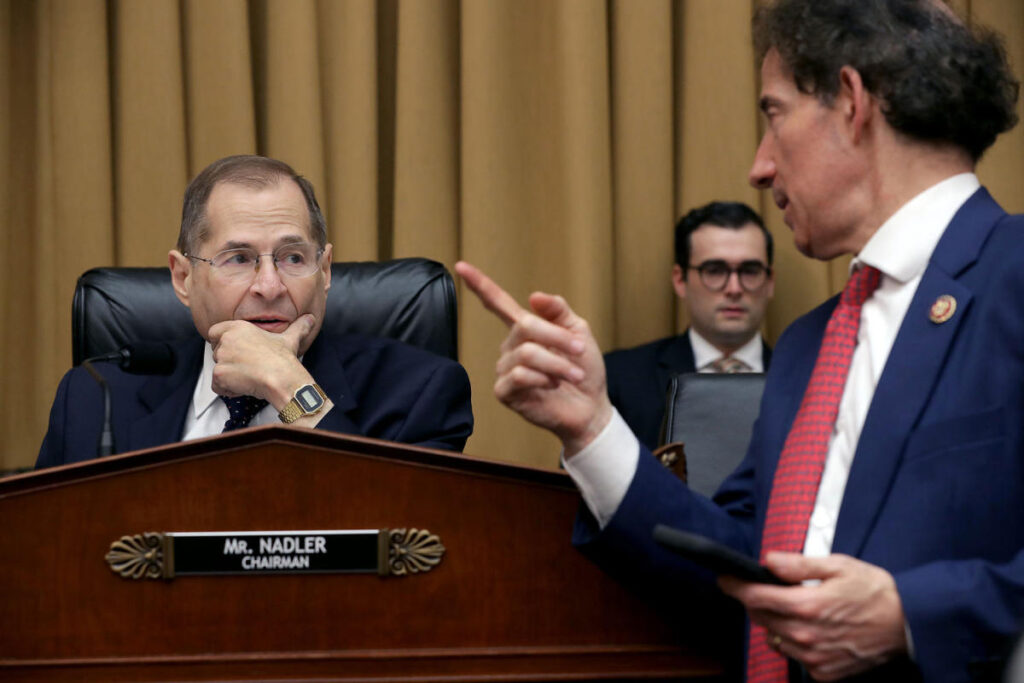Rep. Jamie Raskin, a prominent figure in the Democratic Party and a former constitutional law professor, has announced his intention to challenge long-serving Rep. Jerry Nadler for the chair of the Judiciary Committee, marking a significant generational shift in leadership within the party. Nadler, who is 77 and has held the position since 2019, has represented New York in Congress since 1992 and has faced health issues recently. Raskin’s bold move exemplifies a growing trend among younger Democratic leaders aiming to reshape the party’s direction following disappointing electoral outcomes in 2024. He seeks to position the Judiciary Committee as a staunch opponent to what he describes as authoritarianism and the assault on the Constitution, emphasizing his determination to fight for the rule of law.
In a heartfelt letter to colleagues, Raskin expressed respect for Nadler’s extensive service and achievements throughout his lengthy career, suggesting that he views this challenge not merely as a power grab but as an essential step for the Democratic Party. Raskin highlighted the personal struggles he has faced, including surviving cancer, as motivations for his unwavering commitment to lead the Judiciary Committee in confronting contemporary challenges. His dedication reflects a heightened urgency among Democrats to reassert their values and principles in response to the growing influence of far-right ideologies.
Raskin is not alone in challenging established leaders; Rep. Raul Grijalva has also indicated his desire to take a step back from his role on the Natural Resources Committee, while Rep. Jared Huffman aims to take his place. This change in leadership dynamics is distinctly palpable across various committees, as members like Grijalva, who has served since 2003, and newly rising candidates demonstrate the shifting landscape within the Democratic Party. The movement towards empowering younger representatives signifies a potential overhaul of the party’s existing framework, aiming for renewed energy and perspectives in policy-making.
The push for change is evident in several committee races, including the Agriculture Committee, where representatives Jim Costa and Angie Craig are seeking to unseat the long-serving David Scott. As members grapple with health challenges and the pressures of seniority, these contests reflect a broader conversation about the sustainability of leadership dynamics within Congress. The Democratic Steering and Policy Committee, closely associated with Minority Leader Hakeem Jeffries, is preparing to recommend committee leadership to the full Democratic Caucus, marking a pivotal moment for the party as it seeks to define its future course.
The theme of generational transition within the Democratic Party has intensified following the setbacks experienced in recent elections. After losing their majority in the 2022 midterms, a group of older, established leaders including Speaker Nancy Pelosi and Majority Leader Steny Hoyer stepped aside for a new wave of leadership, including Jeffries and his fellow representatives Katherine Clark and Pete Aguilar. This transition mirrors broader societal discussions regarding age and suitability for leadership roles, setting the stage for younger lawmakers to take on more significant responsibility and influence.
The ongoing negotiations within the party are further complicated by external pressures, particularly concerning President Biden’s potential candidacy for reelection amidst concerns about his age. After calls from his own party to consider stepping back, his vice president, Kamala Harris, was positioned as a natural successor, giving birth to new dynamics as the party looks forward. The narrative tautly entwined with the shifts in leadership suggests that the Democratic Party’s resilience hinges on how effectively it balances experience with the fresh perspectives of younger leaders prepared to tackle contemporary issues and engage a diverse electorate in the years ahead.

